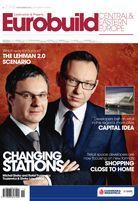How can the need to manage the planet's resources be squared with the competitive demands of the market? can certification schemes such as BREEAM and LEED guarantee investors revenue in future years? These were some of the questions addressed by the 2011 Switch to Green Conference, organised by Eurobuild
Uncertainty as to the eventual monetary value of green certification, the inadequacy of both the BREEAM and LEED certification systems, as well as the need to educate both society and tenants, were all topics that were aired at the Switch to Green conference held in Warsaw's Intercontinental hotel on September 29th. Both Dr Thomas Beyerle, the managing director of IVG Immobilien, and Paweł Warda, Jones Lang LaSalle's head of project and development services in the CEE region, pointed out how developers are being asked to take a leap of faith that in the future the extra investment they place in green buildings will pay off. At present no one really knows. Nonetheless, many developers




























































